To appeal to all those who are growing older—at every age—we suggest some of the best new books on aging, as well as many classics. You’ll find everything from caregiving advice to memoirs, from humor to reflection, plus narratives by authors who set out, in midlife, in search of wisdom and new ways to think about growing older.
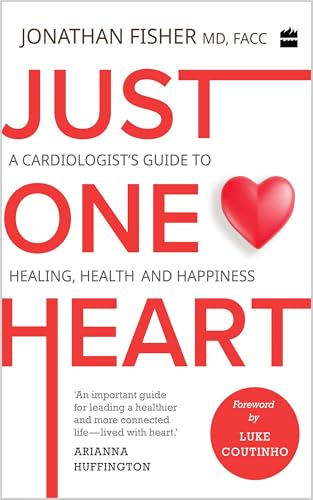 Just One Heart Posted in: Arts, Guides to Aging Well, Insights from Bold Thinkers, Nonfiction
Just One Heart Posted in: Arts, Guides to Aging Well, Insights from Bold Thinkers, NonfictionBy Jonathan Fisher–Manuscripts LLC, 2024
Cardiologist and mindfulness teacher Jonathan Fisher bridges Western science and Eastern wisdom in his search for wholehearted living. Drawing on his own life experiences in overcoming debilitating anxiety and burnout, Fisher now believes that our hearts hold the answer to many of life’s challenges, both physical and spiritual. Revealing seven timeless traits of the heart for reaching holistic health and vitality at any age, he discusses the benefits of mindfulness practices, yoga, tai chi, acupuncture and other bodywork modalities. Some takeaways: good sleep practices and a healthy diet, being kinder to yourself and prioritizing human connection are keys to finding the path to wellness. Conversations with thought leaders on mind-body connections, as well as on aging, offer a compassionate and comprehensive guide to heart health.
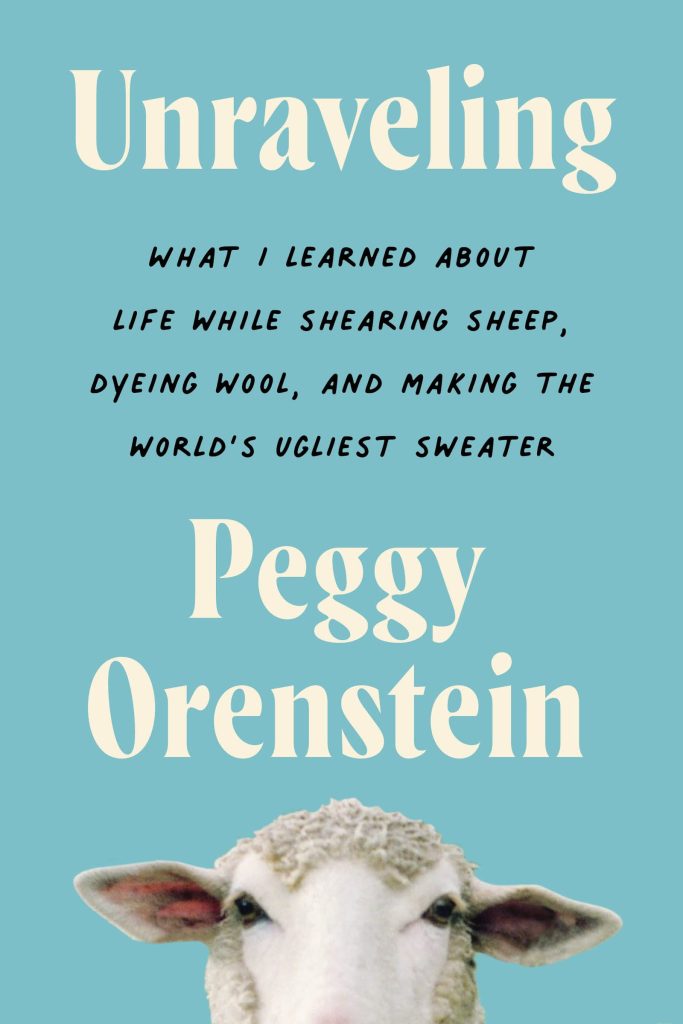 Unraveling: What I Learned About Life While Shearing Sheep, Dyeing Wool, and Making the World’s Ugliest Sweater Posted in: Arts, Inspiring Journeys, Memoirs, Nonfiction
Unraveling: What I Learned About Life While Shearing Sheep, Dyeing Wool, and Making the World’s Ugliest Sweater Posted in: Arts, Inspiring Journeys, Memoirs, NonfictionBy Peggy Orenstein – Harper Paperbacks, 2024
In the wake of the pandemic, lifelong knitter Peggy Orenstein distracted herself from life’s adversities by making a sweater—from scratch. She sheared the sheep, collected its wool, cleaned it, dyed it, spun it and made a sweater. As she recounts this, she reveals her grief over her mother’s passing, her deep concerns for her father and her fears for her college-bound daughter. Orenstein shares the intricacies of fabric crafts, providing readers with a rich understanding of the history and significance of these age-old traditions. She also educates readers on how the act of spinning is woven into everything from myths to metaphors. This story is more than a memoir. It shows us the creativity of women across time, expressing their art through craft—and it’s a thoroughly delightful and enlightening read.
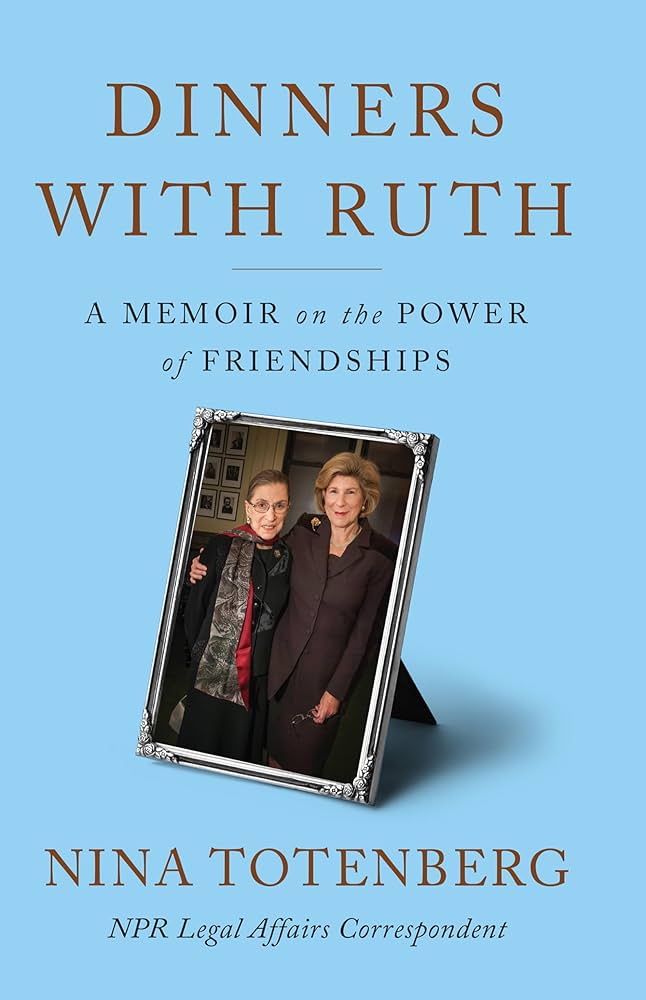 Dinners with Ruth: A Memoir on the Power of Friendships Posted in: Arts, Memoirs, Nonfiction
Dinners with Ruth: A Memoir on the Power of Friendships Posted in: Arts, Memoirs, NonfictionBy Nina Totenberg – Simon & Schuster, 2022
National Public Radio correspondent Nina Totenberg chronicles her nearly 50-year friendship with Supreme Court Justice Ruth Bader Ginsburg. Their friendship began when Totenberg was a young journalist covering the Supreme Court, and Ginsburg was a rising legal scholar. They quickly discovered a shared passion for social justice and women’s rights. They supported each other through personal and professional challenges and shared countless meals, laughter and heartfelt conversations. This biography shows Ginsburg beyond the public figure, revealing her as a complex, witty and deeply caring individual, who worked—and worked out—into her 80s. The book also explores the challenges and triumphs of Totenberg’s career. Totenberg delves into the families, colleagues and friends (you’ll recognize many of them) who uplifted her, both personally and professionally. You won’t want to miss this heartfelt homage to a lifelong bond that will inspire and remind you of the profound impact of human connection.
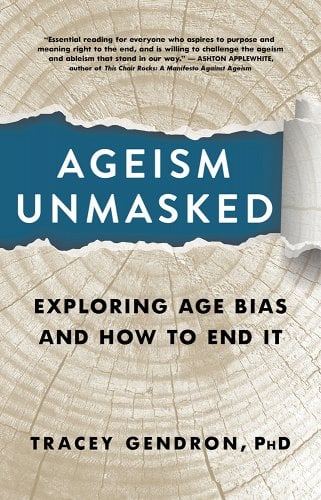 Ageism Unmasked: Exploring Age Bias and How to End it Posted in: Arts, Insights from Bold Thinkers, Nonfiction
Ageism Unmasked: Exploring Age Bias and How to End it Posted in: Arts, Insights from Bold Thinkers, NonfictionBy Tracy Gendron – Steerforth, 2022
Ageism is rampant in today’s society, but how did we get here? Tracy Gendron, PhD, a developmental psychologist and gerontologist, tells a captivating story about the history of age bias with the hope of inspiring an anti-ageist future. She brings readers on a journey through history, spanning from ancient cultures to the Industrial Revolution to the retirement community boom of the 1960s. Gendron asks readers to consider aspects of our society that are deeply rooted in an ageist history, like the mere idea of 65+ living communities or the birthday card section at the stationery shop. Gendron describes “elderhood,” or the developmental stage of older adulthood, and the opportunities that can exist when we acknowledge all the complexities of aging, including losses and dreams alike.
This revealing book is helpful for those who are new to reading about ageism, as it explains foundational concepts and explores the ways that age bias impacts everyone, but it is eye opening even for readers who are well-versed in ageism literature.
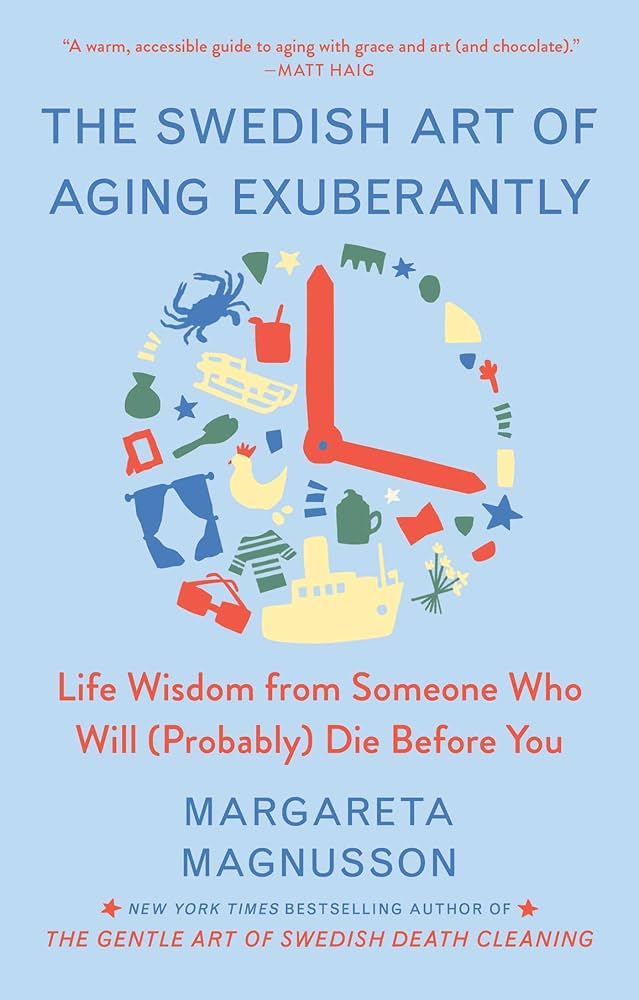 The Swedish Art of Aging Exuberantly: Life Wisdom from Someone Who Will (Probably) Die Before You Posted in: Arts, Guides to Aging Well, Insights from Bold Thinkers, Nonfiction
The Swedish Art of Aging Exuberantly: Life Wisdom from Someone Who Will (Probably) Die Before You Posted in: Arts, Guides to Aging Well, Insights from Bold Thinkers, NonfictionBy Margaretta Magnusson – Scribner, 2022
This delightful book offers gentle tips on aging gracefully: laugh often, engage the company of people younger than yourself, keep an open mind, wear stripes, eat chocolate and care for something. Magnusson shares her unique perspective on growing older, blending humor, wisdom and practical advice from Swedish culture. She emphasizes the beauty of aging—a concept often eluding women as they age.
Her anecdotes and insights are both relatable and heartwarming, making the book a perfect companion for anyone navigating the complexities of aging. Magnusson shows us how to prepare for and understand the aging process and the joys and sorrows it can bring. While she recommends ongoing downsizing and decluttering (your loved ones will thank you!), her ultimate message is that we should all be less afraid of the idea of death. Whether you’re entering your golden years or simply curious about the art of living well, this book is a treasure.
Magnusson is also the author of The Gentle Art of Swedish Death Cleaning.
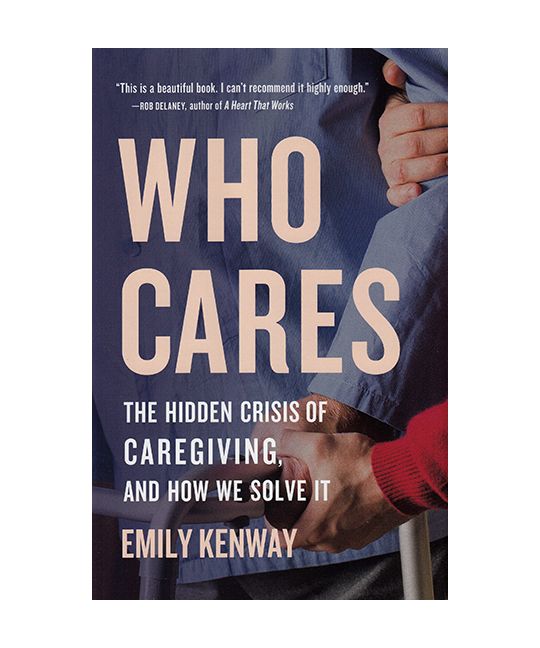 Who Cares: The Hidden Crisis of Caregiving and How We Solve it Posted in: Arts, Insights from Bold Thinkers, Nonfiction
Who Cares: The Hidden Crisis of Caregiving and How We Solve it Posted in: Arts, Insights from Bold Thinkers, NonfictionBy Emily Kenway – Seal Press, 2023
It is not every day that you read a book that changes your perspective on society at large and the role you play in it. Who Cares: The Hidden Crisis of Caregiving and How We Solve It is an intelligent, eye-opening publication about a world in dire need of caregivers and the inadequacies of support on an international scale. Kenway shares intimate stories of caregivers all over the world, including her own caregiving journey for her mother through a grueling battle with cancer. She thoughtfully outlines the complexities of caregiving as a chronic stressor, a deeply meaningful experience of human connection and, most importantly, a reality of life.
Kenway explores possible solutions that may alleviate the crisis of caregiving, including new technology, government policies, innovative housing solutions and community support. She leaves readers feeling empowered that the solution begins within us. This is a book for everyone—because everyone will give care and need care, if they have not yet already, at some point in their life.
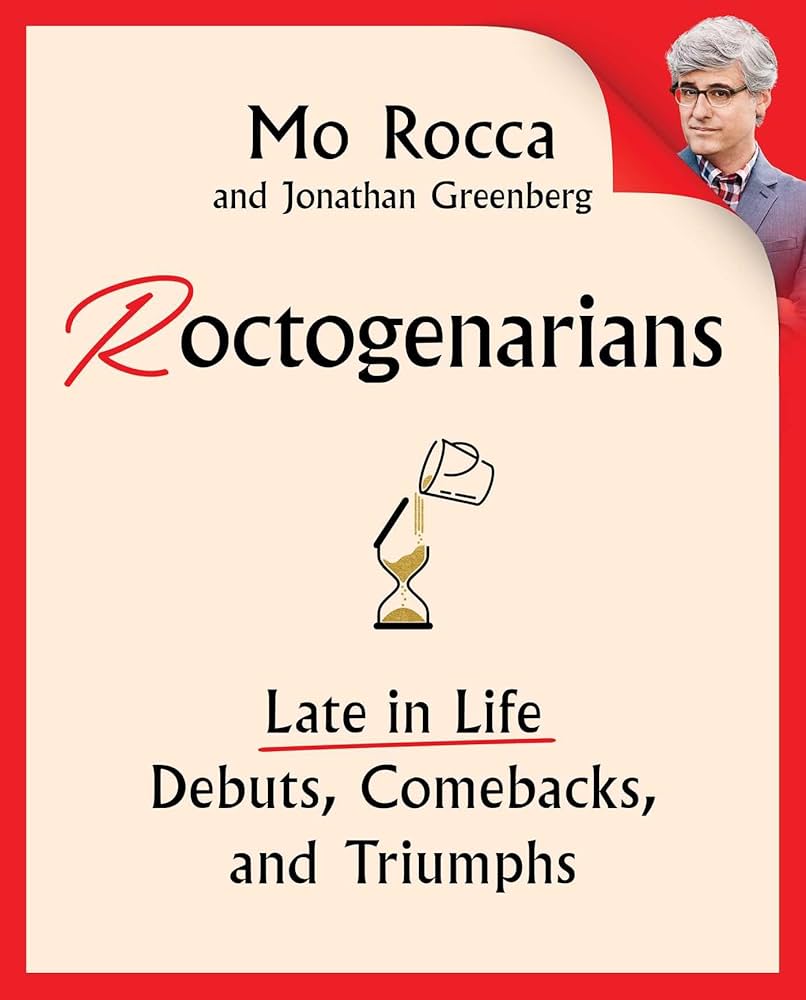 Roctogenarians: Late in Life Debuts, Comebacks, and Triumphs Posted in: Arts, Nonfiction, Views from the Oldest among Us
Roctogenarians: Late in Life Debuts, Comebacks, and Triumphs Posted in: Arts, Nonfiction, Views from the Oldest among UsBy Mo Rocca and Jonathan Greenberg – Simon and Schuster, 2024
This book challenges the idea that people’s accomplishments dwindle as they age. It highlights older adults whose passion and determination pushed past setbacks, health issues, career obstacles and more to achieve great things later in life. Roctogenarians profiles people from all walks of life: an 83-year-old soldier, an activist, actress Rita Moreno, physician Peter Mark Roget (creator of Roget’s Thesaurus). This diversity of achievers ensures that every reader can find someone they can relate to in this book. Known for his wit and engaging storytelling, Mo Rocca’s approach is laced with humor, empathy and a deep appreciation for the human spirit. Prepare to be entertained and inspired.
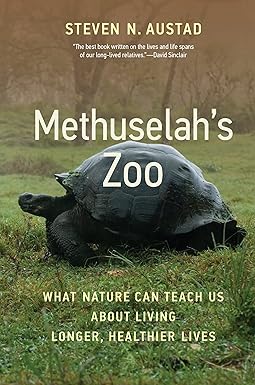 Methuselah’s Zoo: What Nature Can Teach Us about Living Longer, Healthier Lives Posted in: Arts, Insights from Bold Thinkers, Nonfiction
Methuselah’s Zoo: What Nature Can Teach Us about Living Longer, Healthier Lives Posted in: Arts, Insights from Bold Thinkers, NonfictionBy Steven N. Austad – The MIT Press, 2022
What do naked mole-rats, tubeworms, lake sturgeons and cockatoos have in common? Each species is a part of a group of animals with the highest longevity quotient— the life expectancy within a zoo or sanctuary of a specific animal species compared to other animal species of the same size. (For example, in a lab setting, a naked mole-rat lives 6.7 times longer than other small mammals.)
Steven Austad, a biologist from the University of Alabama at Birmingham, has dedicated his career to studying these spectacular species in the hopes of learning more about how humans can optimize the aging process. He takes readers on an educational journey about the science behind what makes each of these species unique, sharing the stories of Little Mama, the chimpanzee who supposedly lived to 79 years old, and Barbara the African elephant, who died at the estimated age of 72.
Many questions are still unanswered by the scientific community, like what makes certain species almost completely immune to developing cancer or how birds and bats live exceptionally long with minimal physical decline across their lifespan. There is so much more to learn about species that are aging more successfully than humans. The key to developing medical treatments that lead to longer lives may be right in front of our eyes. As Austad would say, “nature is endlessly inventive.” Animal lovers—and any reader curious about life—will not be able to put this one down.
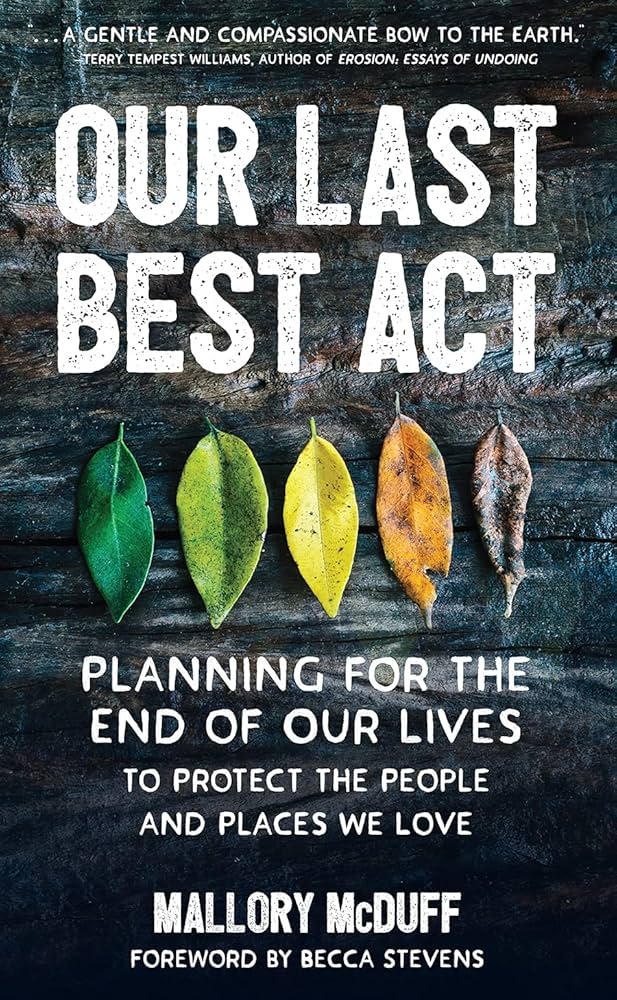 Our Last Best Act: Planning for the End of Our Lives to Protect the People and Places We Love Posted in: Arts, Life’s Endings, Nonfiction
Our Last Best Act: Planning for the End of Our Lives to Protect the People and Places We Love Posted in: Arts, Life’s Endings, NonfictionBy Mallory McDuff — Broadleaf, 2021
Mallory McDuff delves into the concept of sustainable and meaningful end-of-life planning, highlighting the significance of aligning one’s death with environmental and spiritual values. After her parents passed away unexpectedly, McDuff realized she was unprepared to honor their wishes. This realization led her on a journey to comprehend and document eco-friendly burial practices, such as green burial and human composting.
The book bridges environmental concerns and religious faith, advocating for a death plan that respects personal values and the planet’s health. Through her personal story and extensive research, McDuff urges readers to contemplate how their end-of-life choices can create a positive legacy. The book offers practical advice and information, empowering individuals to make well-informed decisions about their end-of-life planning and establish a sustainable, respectful legacy for future generations.
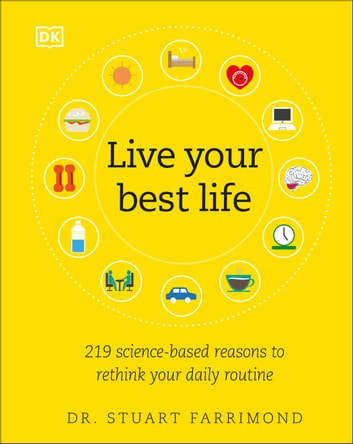 Live Your Best Life: 219 Science-Based Reasons to Rethink Your Daily Routine Posted in: Arts, Guides to Aging Well, Nonfiction
Live Your Best Life: 219 Science-Based Reasons to Rethink Your Daily Routine Posted in: Arts, Guides to Aging Well, NonfictionBy Stuart Farrimond, MD – DK, 2020
Looking for science-based advice on how to improve your daily routine? This book is structured around a typical day and covers topics such as dreaming, breakfast, beating the afternoon slump, exercise, weight loss, diet and the impact of smartphones on your sex life. The book contains fascinating statistics and infographics that debunk common health myths, and it offers practical advice for implementing positive changes. You’ll find the answers to questions such as: why you forget the reason you came into a room; why it’s hard to get motivated to exercise; and what’s the best time of day to take vitamins. You’re sure to find valuable insights that will help you live your best life.
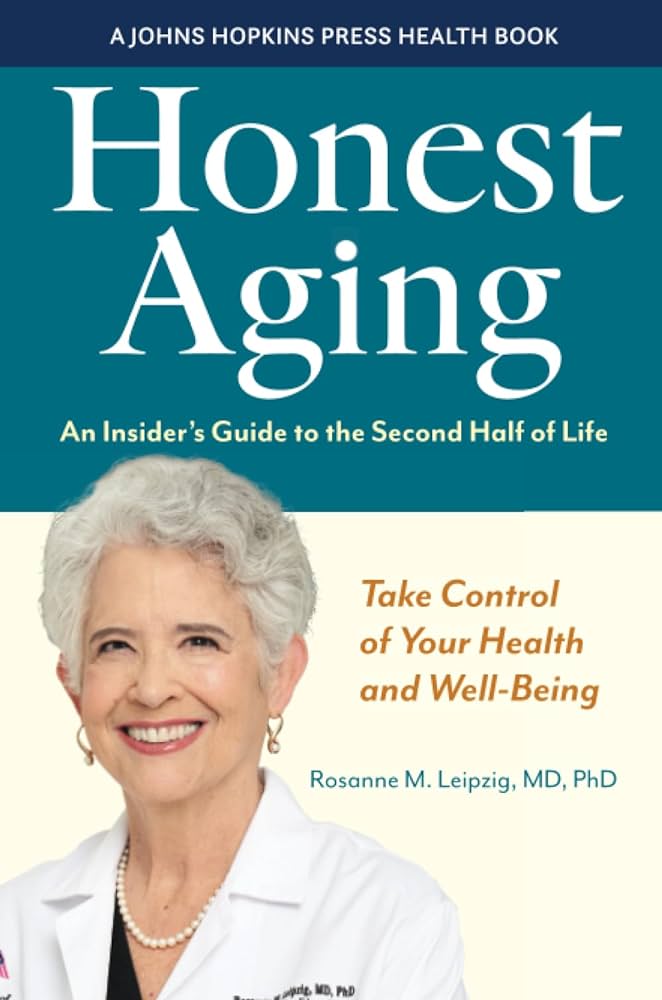 Honest Aging: An Insider’s Guide to the Second Half of Life Posted in: Arts, Insights from Bold Thinkers, Nonfiction
Honest Aging: An Insider’s Guide to the Second Half of Life Posted in: Arts, Insights from Bold Thinkers, NonfictionBy Rosanne M. Leipzig, MD, PhD – Johns Hopkins University Press, 2023
If you buy but one reference book this year, make it this one. Written by a trailblazing geriatrician with over 35 years of experience, Honest Aging aims to be your comprehensive guide to navigating the second half of life. It tackles aging head-on, offering realistic insights into the physical, psychological, functional and emotional changes you might encounter.
The book doesn’t shy away from discussing the challenges and losses associated with aging, but it also emphasizes the opportunities and positive aspects. On each subject, the question of what’s expected in aging is addressed in layman’s terms, and there is a deeper–dive section. It covers physical changes like hearing loss and mobility issues, psychological aspects like grief and identity shifts, functional changes like managing daily tasks, and emotional health in later years. It offers practical strategies for prevention, adaptation and maintaining well-being.Honest Aging empowers readers to take charge of the aging journey, equipping us with the knowledge, tools and outlook we need to navigate the second half of life with confidence.
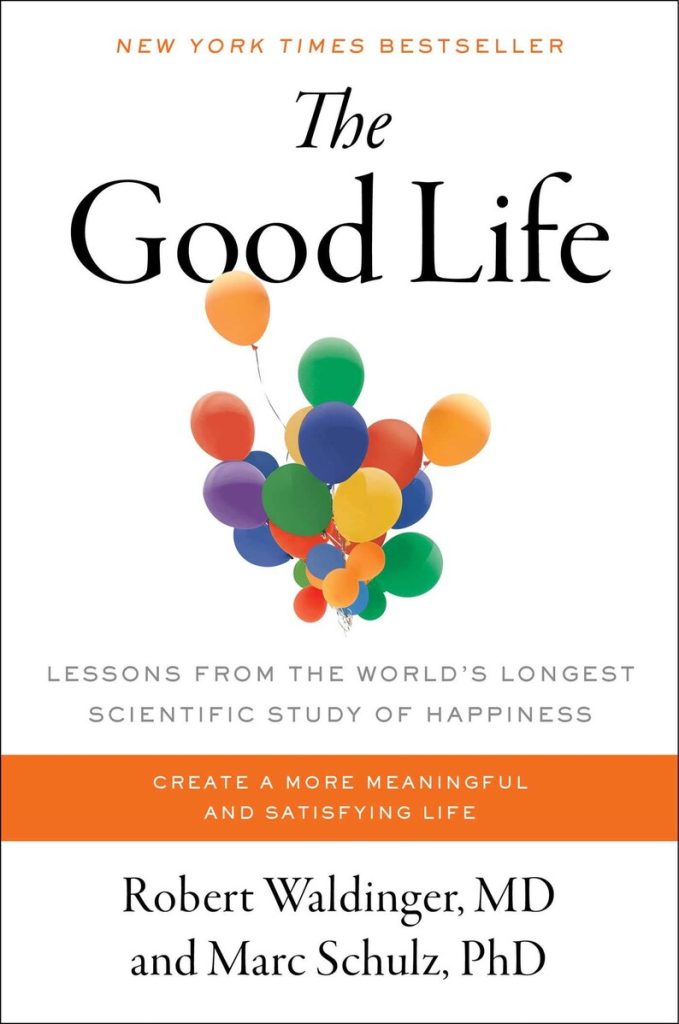 The Good Life: Lessons from the World’s Longest Scientific Study of Happiness Posted in: Arts, Guides to Aging Well, Nonfiction
The Good Life: Lessons from the World’s Longest Scientific Study of Happiness Posted in: Arts, Guides to Aging Well, NonfictionBy Robert Waldinger, MD, and Marc Schulz, PhD – Simon and Schuster, 2023
We live in an age of hyper-connectedness, and yet people are dying of loneliness. It is more important than ever to cultivate solid and positive relationships—family, friends, romantic partners and even casual connections, at every stage of our lives. Feeling like your life makes a difference to another person provides motivation and resilience for the tough times we all experience.
The authors draw on the ongoing Harvard Study of Adult Development. Initiated 85 years ago, it is the longest-running study of its kind. The Good Life features compelling personal stories of study participants, shedding light on their experiences and how their lives unfolded. The simple but not always easy takeaway is that positive relationships keep us happier and healthier and help us live longer. While the book is grounded in the Harvard study, it also incorporates insights from other research, as well as the authors’ own experiences, to create a comprehensive and practical approach to finding happiness and creating a fulfilling life.
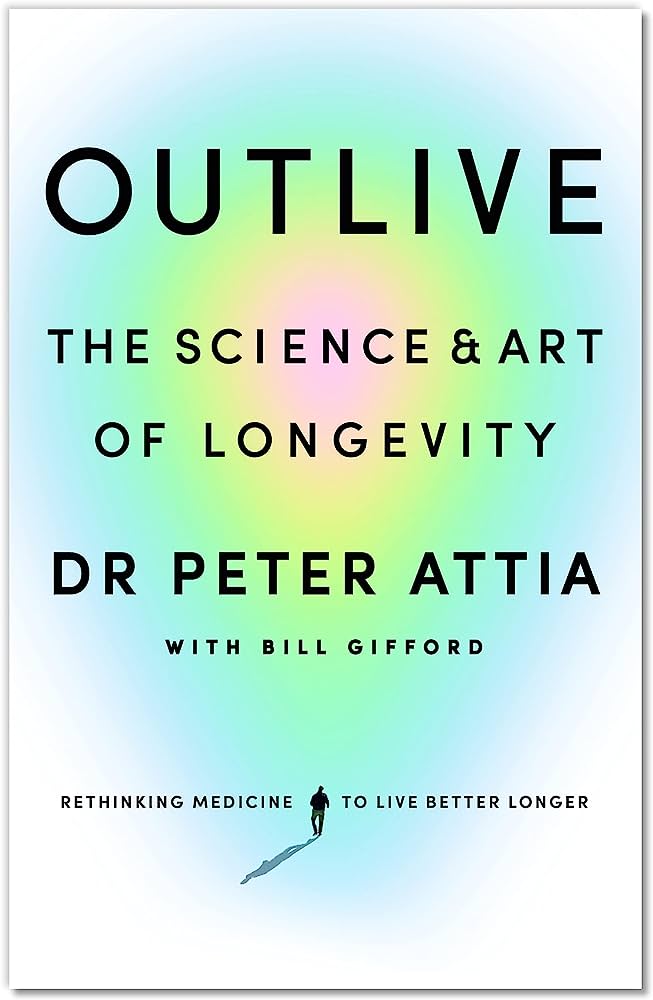 Outlive: The Science and Art of Longevity Posted in: Arts, Guides to Aging Well, Nonfiction
Outlive: The Science and Art of Longevity Posted in: Arts, Guides to Aging Well, NonfictionBy Peter Attia, MD, with Bill Gifford — Harmony, 2023
Did you ever wish for an owner’s manual for a long and healthy life? Outlive delves into the latest scientific research on longevity and provides practical strategies for implementing those findings in your life. Attia identifies what he calls “four pillars of longevity”: exercise, nutrition, sleep and emotional well-being. He also discusses “the four horsemen,” the major chronic conditions that threaten longevity: cardiovascular disease, cancer, cognitive decline and diabetes. We learn that between the ages of 50 and 60, our bodies start to reveal the repercussions of our lifestyle choices, making this the decade to adopt healthy habits if we haven’t already done so. Outlive also offers a companion workbook to help put new goals into action, so we can increase our chances of living a long, healthy, fulfilling life.
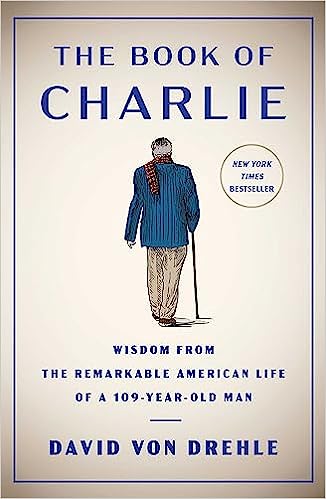 The Book of Charlie: Wisdom from the Remarkable American Life of a 109-Year-Old Man Posted in: Arts, Nonfiction, Views from the Oldest among Us
The Book of Charlie: Wisdom from the Remarkable American Life of a 109-Year-Old Man Posted in: Arts, Nonfiction, Views from the Oldest among UsBy David Von Drehle – Simon and Schuster, 2023
Writer David Von Drehle was new to the suburbs of Kansas City when he first spotted his neighbor in the driveway, wearing swim trunks and washing his girlfriend’s car. Charles “Charlie” White III was 102 years old at that time.
What sets this biography apart is how Von Drehle takes us through America’s history along with Charlie’s—as he grows older, so does America. We meet Charlie at age 8, when his father dies, then learn of his many friendships and how his “always do the right thing” philosophy of life impacted everything he did. He listened to jazz on the radio and taught himself to play the saxophone, which became his way of earning money to pay his way through medical school. We go with Charlie through Prohibition and the Depression and the construction of the state’s largest hospital, where he became the city’s first anesthesiologist, practicing through his 80s. We learn of his relationships and how his philosophy of life impacted everything he did. His mother encouraged him to do the right thing, and so Charlie did for a remarkable 109 years. Through grit and determination, and always with a bit of humor, Charlie White took us through the decades of the 1900s. It’s a heck of a ride.
 The Marmalade Diaries: The True Story of an Odd Couple Posted in: Arts, Inspiring Journeys, Nonfiction
The Marmalade Diaries: The True Story of an Odd Couple Posted in: Arts, Inspiring Journeys, NonfictionBy Ben Aitken – Icon Books, 2022
In a story so utterly charming you’ll double- or triple-check to see if it’s truly nonfiction, Ben Aitken enters a Share and Care arrangement with 86-year-old Winnie Carter, 50 years his senior. In the United Kingdom, this home-sharing model offers room and board for a fraction of the cost in exchange for companionship and a few chores. Clearly, it takes a certain kind of pair to make it work.
Ben is a bit of a nomad, a travel writer who has written, among other things, of his experiences on bus tours with people who had retired. He is more than ready for this adventure. Winnie is a recently widowed aristocrat, living in a large home outside London; she can live independently but for a few tasks requiring some muscle.
Initially, Winnie is nonplussed; she doesn’t welcome Ben as much as she tolerates him—he’s a millennial, after all. She’s quick-witted, acerbic and set in her ways. Though well-traveled, Ben seems to have missed key life lessons, thinks Winnie, who finds she must educate him on everything from boiling an egg to properly warming plates. The pandemic lockdown begins almost immediately after they commit, forcing the unlikely duo into a closer bond than either anticipated. Ben’s daily entries into his lockdown diary become the basis for this laugh-out-loud, British-to-the-core story. It’s packed full of Winnie’s witty repartees and non sequiturs, and it is a joy to read.
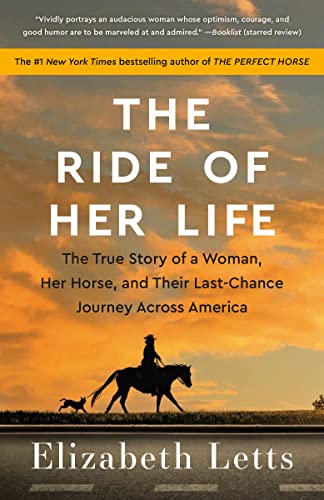 The Ride of Her Life Posted in: Arts, Inspiring Journeys, Nonfiction
The Ride of Her Life Posted in: Arts, Inspiring Journeys, NonfictionBy Elizabeth Letts – Random House Publishing Group, 2022
In 1954, at age 62, Maine farmer Annie Wilkins was told that if she took it easy, she likely had two years to live (her diagnosis: terminal tuberculosis). Her moral and physical fortitude and her unfailing optimism allowed her to take the news in stride. She declined the offer to live in a county rest home (she lost her farm to back taxes) and sold what little she had left. Annie bought an aging horse named Tarzan and, along with her beloved mutt, Depeche Toi, rode west to fulfill a lifelong dream to see the Pacific Ocean. The Ride of Her Life shares the remarkable story of Annie’s journey, detailing all the surprises, hardships, joys, mishaps and extraordinary human kindnesses she experienced along the way. Without a map, GPS or cell phone, Annie traveled 4,000 miles through all kinds of weather, engaging with people you wish you could meet. This true story, sure to cement your faith in humanity, is a life-affirming tale of a woman living out her days on her own terms.
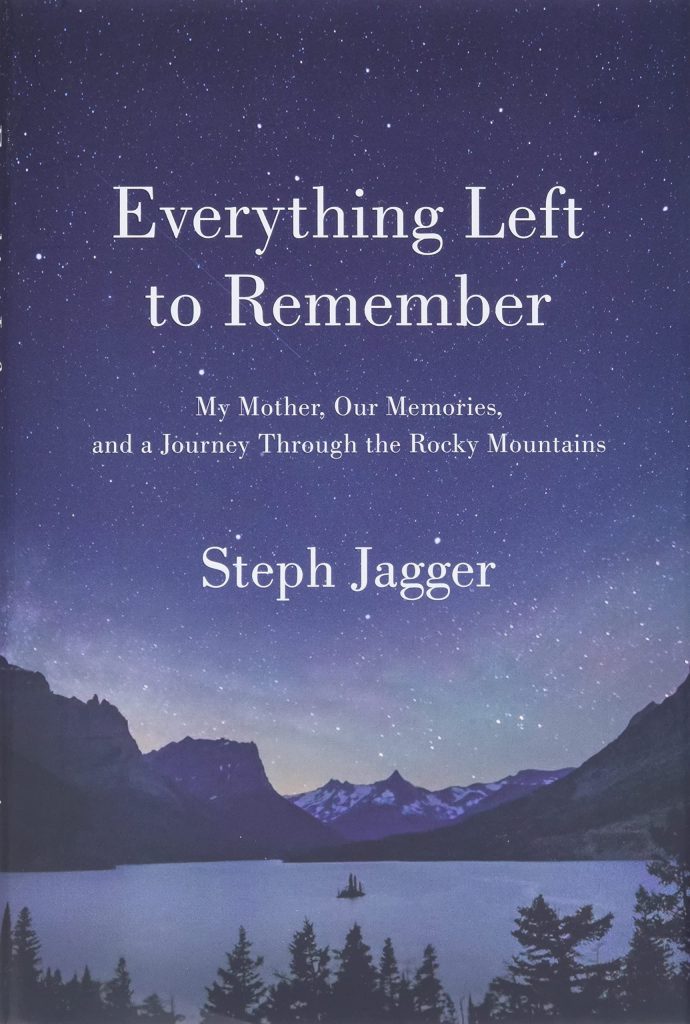 Everything Left to Remember: My Mother, Our Memories, and a Journey Through the Rocky Mountains Posted in: Arts, Inspiring Journeys, Memoirs, Nonfiction
Everything Left to Remember: My Mother, Our Memories, and a Journey Through the Rocky Mountains Posted in: Arts, Inspiring Journeys, Memoirs, NonfictionBy Steph Jagger — Flatiron Books, 2022
Steph Jagger embraces a quest like no other as she takes her 70–year-old mother, Sheila—recently diagnosed with Alzheimer’s—on a camping trip through the US national parks. Jagger is no stranger to the heartbreak of this disease—her maternal grandmother also had dementia at the end of her life. Jagger can’t help but wonder if she too will suffer this horrible fate. In part, that’s why she understands the time sensitivity and necessity of this trip. It’s a monumental undertaking, for certain, but Jagger believes she owes herself the chance to more deeply connect and learn who her mother truly is before Sheila is lost to her. Together, they hike and camp as they did when Steph was younger. They lie under the stars or see Old Faithful on horseback when words fail them, as they often do. Sheila can navigate trails but can’t always remember where she is or with whom; sometimes, her memory loss seems insignificant, but when asked about her favorite memories, she comes up short. On the other hand, Jagger’s poetic way with imagery and emotion often leaves the reader in awe. This memoir illuminates the complexity, grief and beauty of mother-daughter relationships while appreciating the sacred power of Mother Nature. It’s heartbreaking in the best possible way.
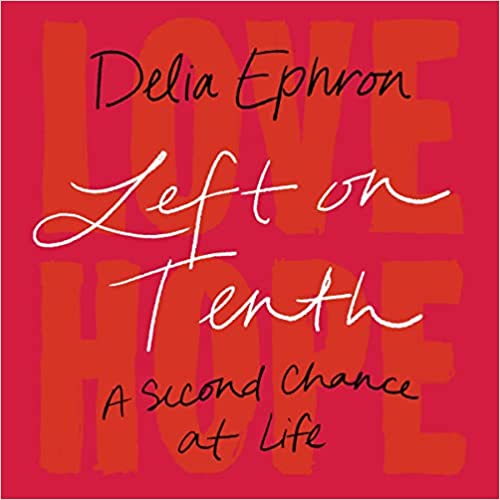 Left on Tenth: A Second Chance at Life Posted in: Arts, Memoirs, Nonfiction
Left on Tenth: A Second Chance at Life Posted in: Arts, Memoirs, NonfictionBy Delia Ephron — Little Brown and Company, 2022
You likely know the name Delia Ephron from her novels and screenplays and for producing (with sister Nora) blockbusters like You’ve Got Mail, Sleepless in Seattle and The Sisterhood of the Traveling Pants. Her recent memoir begins with the loss of her beloved husband, Jerry, to prostate cancer. They’d been married since 1982, and she admits she never expected to find love again. But a series of confluences put her in the path of Peter, a man with whom she felt an instant connection. (They had gone on a blind date 50 years ago!) Now both widowed in their 70s, they were delighted at the prospect of love a second time around. And then came the diagnosis: Delia had AML, the same type of leukemia that savagely took her sister Nora just years before. Despite that, Delia and Peter married in the hospital before she underwent an experimental treatment that had her hospitalized for 100 days, in pain so consuming she often wished to die. Though that sounds grim, this story has a happy ending that will charm and move you.
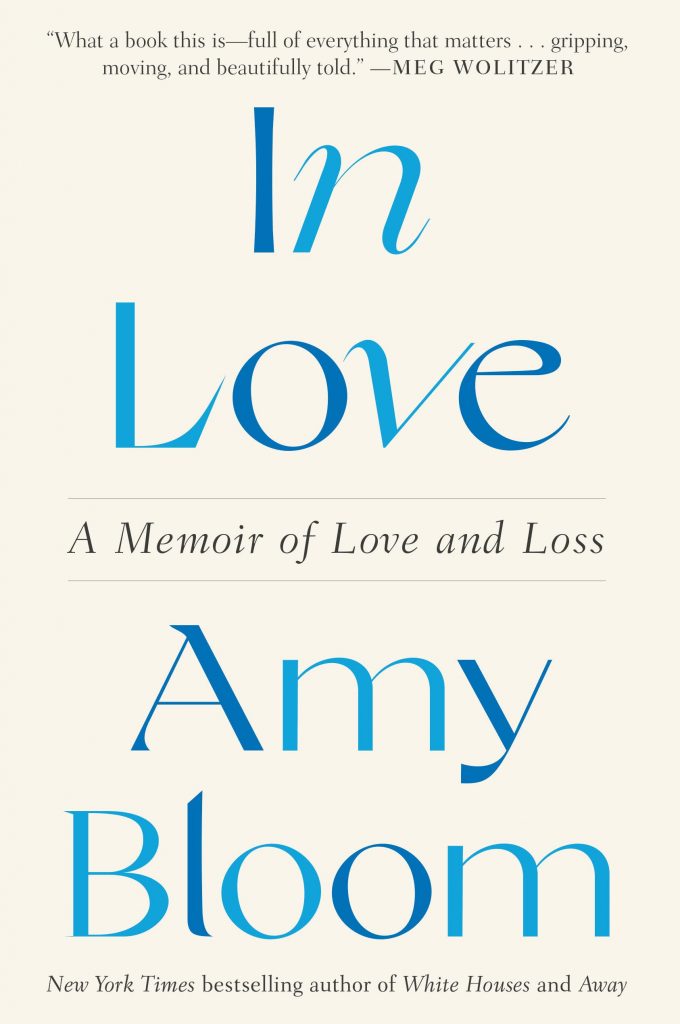 In Love: A Memoir of Love and Loss Posted in: Arts, Memoirs, Nonfiction
In Love: A Memoir of Love and Loss Posted in: Arts, Memoirs, NonfictionBy Amy Bloom—Random House, 2022
Amy Bloom and Brian Ameche found each other in a later-life romance, and Brian was enveloped into Amy’s family, relishing life as a grandfather to Amy’s grandchildren. They enjoyed an enviable life of travel, fine food and friends. But Ameche had some tell-tale signs of diminished memory and function, and although he had total recall of the past, he was starting to lose the here and now. He asked Amy to research his options for assisted suicide, which were limited, even with “right-to-die” laws, and posed near-impossible hurdles. What Bloom eventually discovered was a nonprofit in Switzerland called Dignitas that offers physician-assisted “accompanied suicide.” Bloom now shares how she obtained admission for Ameche to become a patient and how they carried out his final wishes. The memoir offers many provocative topics for discussion: the US health care and legal systems, the options at the end of life, and the support—or lack thereof—for families when Alzheimer’s is upon them. Sad but not morbid, this is the candid and powerful story that Bloom promised her husband she would write.
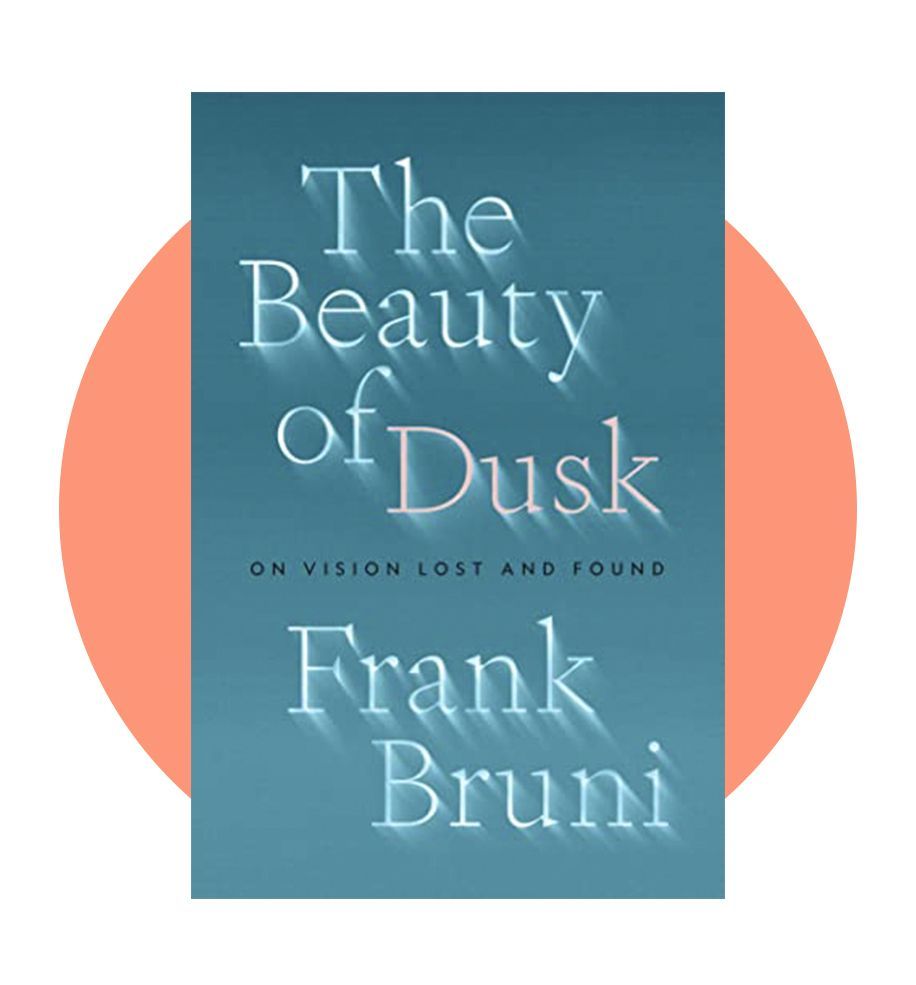 The Beauty of Dusk: On Vision Lost and Found Posted in: Arts, Memoirs, Nonfiction
The Beauty of Dusk: On Vision Lost and Found Posted in: Arts, Memoirs, NonfictionBy Frank Bruni—Simon and Schuster, 2022
Frank Bruni is an award-winning American journalist and a longtime writer for the New York Times. He awoke one morning to find the vision in his right eye was blurred and he had no idea why. So begins his journey to save his vision and manage the powerful emotions that accompany his prognosis. Bruni learns he has had a stroke that affected his optic nerve—and that his vision might not return. At the same time, his partner takes up with another man, leaving Bruni alone and vulnerable emotionally. To cope, Bruni sets to talking with people who have faced diagnoses of comparable severity, and he learns new skills for coping from them all. While as readers, we may not be losing our eyesight, we are all facing hurdles that come with aging, so we can relate as Bruni writes eloquently about feeling dependent, asking for help and mastering new skills.


